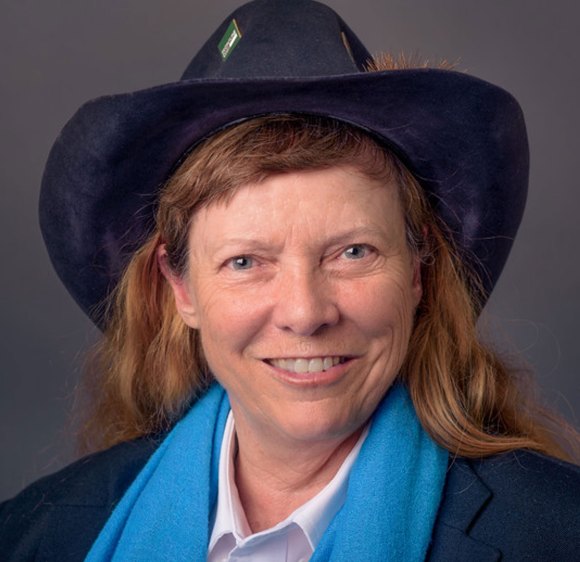 Hunter Lovins ’72
Hunter Lovins ’72Pitzer College alumna Hunter Lovins ’72, chief of impact at Change Finance, is part of a majority women-run management team that has created the first Certified Carbon Neutral Exchange Traded Fund in the US designed to combat climate change. Change Finance, which develops financial products for sustainability-minded investors, says it created the carbon-neutral fund (CHGX) in direct response to what the world of science has long known: climate change is real, measurable, and human-caused.
In partnership with the financial technology platform EthosESG, Change Finance engineered a carbon-neutral certification process specifically geared toward asset managers. The company uses its own proceeds to pay for 100 percent of the carbon offsets. As a fund manager, Change Finance is a partial owner of the companies included in the fund, which in turn means they become partial owners of their carbon footprint. Their commitment is to sequester 100 percent of the carbon their investment portfolio is responsible for. They partnered with Verity Platforms, a sustainable finance firm, to help procure an accurate assessment of each company’s carbon footprint and then aggregated that across the fund to determine the CHGX portfolio-level carbon footprint.
The genesis of Change Finance began in 2012. Lovins, who is also president and founder of Natural Capitalism Solutions, a nonprofit in Longmont, CO, was brainstorming with women friends about building their own fund. “We said, if we were going to build a fund with the companies we would want to own, what would it be?”
They looked at various companies and said, “This one’s in, this one’s out,” based on the companies’ carbon footprint. They built a set of first principles on making their investment decisions.
The name Change Finance was intentional, Lovins said. “Finance needs to change—and we have set out to change finance.”
The finance industry was at first skeptical of their new venture. The women were assured they had a good idea, but investment will be difficult for the first three years, except for investors with very strong values. Experience in the industry and a minimum of $25 million under management are necessary before any serious investor will consider getting involved.
It did take three years, and suddenly the $25 million under management jumped to $50 million, then to $100 million. “Now, institutional investors were coming around, especially with all the emphasis on climate,” said Lovins.
Lovins’ role with Change Finance is both internal and external: to look at the companies they hold, determine if they are truly fossil-fuel free and practice high ESG (Environmental, Social, and Governance) criteria (e.g., how a company performs as a steward of nature, how it manages relationships, and how it deals with leadership, audits, and internal controls) and see if they are the kind of companies socially conscious investors would want to own.
“A lot of people say, ‘I own Exxon, I hate what they do, but they make me a lot of money.’ It turns out that if you held CHGX versus Exxon, you would have done better with us,” Lovins said.
Now, Change Finance’s clients are asking Lovins to build teaching materials for them to determine if a company they are auditing is net zero. “The corporate world woke up,” said Lovins. “We now live in a different world than we did in 2020. Good thing, too.”
Lovins believes that is not enough to aim for “net zero” in terms of carbon emissions. “Net zero just means you’re staying in the same place. We need to be carbon negative,” she says.
Change Finance searches for projects with the most carbon sequestration potential that also focuses on improving biodiversity while supporting marginalized populations. Lovins thinks that we should be converting agriculture, which is at present responsible for about 30 percent of greenhouse gasses, to regenerative agriculture. This means growing crops that then put carbon into the ground—or using grazing animals that allow the grass to do that naturally, she says.
Change Finance says it chose to focus on regenerative grazing because it is not only more productive in terms of the amount of carbon captured, but it also supports rural communities. The firm searched for projects with the most carbon sequestration potential that also focus on improving biodiversity while supporting marginalized populations. They found Grassroots Carbon, a group that removes carbon from the atmosphere and stores it in the soil via regenerative grazing. Grassroots Carbon also has a specific focus on marginalized groups such as women ranchers, ranchers of color, and Indigenous peoples, Lovins said.
Lovins has devoted her career to looking for creative solutions to environmental challenges. She has co-authored 16 books, and her best-known book, Natural Capitalism, won the Shingo Prize in 1999. Time magazine dubbed her as a Millennium Hero for the Planet, and Newsweek called her a Green Business Icon. She earned her BA at Pitzer in sociology and political science and holds a JD from Loyola Law School. In 2005, Pitzer awarded Lovins the Distinguished Alumni Award.
“It’s great to see a Pitzer graduate leading the way in the responsible investing field,” said Pitzer College Board of Trustees Chair Don Gould, who was a prime mover behind the College’s 2014 decision to divest the college’s endowment of fossil fuel stocks and apply ESG standards across its entire stock portfolio. “Hunter’s work perfectly illustrates how Pitzer students can apply the College’s core values in their career choices, and in the process make meaningful change.”
Nearly 50 years since she graduated from Pitzer, Lovins advises today’s students: “Find what you care about and live a life that shows it.”
“The world is changing incredibly rapidly,” said Lovins. “Fossil fuels are on the way out. Now, what kind of a world do we want to live in? And how do we create it?”